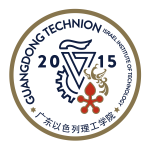Guangdong Technion - Israel Institute of Technology (GTIIT), China & Technion-Israel Institute of Technology, Israel.
The Materials Science and Engineering Program (group of Assoc. Prof. Aleksandra Baron-Wiechec) is looking for highly motivated PhD/Master students. After graduation, students will be awarded a Technion-Israel Institute of Technology degree certificate.
There are three main topic in Baron-Lab for MSc and PhD candidates.
MagniFiCor – Magnetism for the functionalization of metallic materials surfaces and its effect on corrosion phenomena
The project involves both experimental work and mathematical modelling of the experimental results, thus the aim is to form a team of 2 students with complementary skills and interests. The primary objectives of the research are as follows:
- to build a corrosion test rig for studying the combined influence of magnetic fields and flow of corrosive medium on materials performance.
- to determine the mechanism of electrochemical corrosion under the magnetic field
- to develop phenomenological models describing a mechanistic understanding of the interaction between the magnetic field and corrosion phenomena based on the acquired results
- to combine the analysis of electrical signal of corroding sample and the microscopic observation with automatic classification of corrosion phenomena by Machine Learning and early-time prediction of corrosion from precursor signals
The project will be carried out mainly in China (Baron-Lab www.baron-lab.com) and partially in Poland (NOMATEN Centre of Excellence http://nomaten.ncbj.gov.pl/ ) with possible short visits to labs in Finland (VTT) and France (INSP) – all depends on travel conditions. For the MSc and PhD candidate also 1-2 semesters at the Technion in Israel is also intended.
Nanoxide – Tailoring of nanoporous anodic oxides for the functionalization of metal surfaces
Electrochemical oxidation is a way of obtaining controlled nanostructured oxides on large scale surfaces. The process involves the electrochemical conversion of metal or alloy surfaces in various liquid electrolytes, by applying a combination of current and potential, in a process called anodizing. Despite many years of research, there are still major uncertainties and knowledge gaps in the mechanism of initiation and pore growth in anodic alumina. Better understanding of the mechanism will enable to control and tailor the functionalities of metallic materials surface for specific applications in electronics, nanotechnology, biomaterials and bio-coatings.
Key issues for investigation incudes: the role of anions contaminants and in the generation of porosity, the criteria for generation of porosity under a wide range of anodizing conditions relevant to porous alumina growth, calculate the efficiency at which porous alumina films may be formed. You will use Hydrogen and Oxygen stable isotopes to study the anodizing mechanism by applying complementary techniques: Ion Beam Analysis (IBA) and SEM. Access to IBA at INSP in France will be gained by submitting a competitive project proposal to TA (Transnational Access to ion beam facilities in Europe). There will be opportunity to work on industry project with experts from of one of the western companies established in southern China.
HyDRes – Hydrogen and Deuterium retention study (understanding retention and transport of H and D in metallic materials)
Our current energy landscape is heavily dependent on the fast-depleting fossil fuels, changing this dependence is critical to cut down on the greenhouse gas emissions. One of the future solution for energy source problems is nuclear fusion. One of many technological challenges of nuclear fusion power reactor is its water cooling system and presence of radioactive Tritum in cooling medium – water. Tritium permeation through metallic materials and oxide coatings in a fusion environment is a serious concern. The aim of the project is to understand a mechanism and estimate hydrogen and deuterium (as a proxy for Tritium) permeation through metals and protective oxide layer formed on metals.
Hydrogen (H) or Deuterium (D) will be introduced in materials by electrochemical methods. Coatings will be analyzed “as received” and after various treatment (surface or bulk heat treatment) to amend their structure and properties. Samples will be studied by Thermal Desorption Spectrometry (TDS), and electron microscopy, retention and amount of hydrogen isotopes will be determined by developing a suitable calibration procedure.
- Bachelor or Master’s degree in Materials Science and Engineering, Chemical Engineering, Chemistry, or a related field (essential)
- Good communication skills, good command of English (essential)
- Chinese language skills (preferred)
- Ability to work independently and in a team environment (essential)
- Ability to author scientific reports and co-author scientific publications (essential)
- Candidates must fulfill the requirements for admission to the Technion Graduate School and needs to comply with its regulations leading to the PhD/Mater’s degree: https://graduate.technion.ac.il/en/prospective-students/
- Application deadline: open until filled
- If interested, contact Assoc. Prof. Aleksandra Baron-Wiechec with a curriculum vitae: aleksandra.baronw@gtiit.edu.cn

